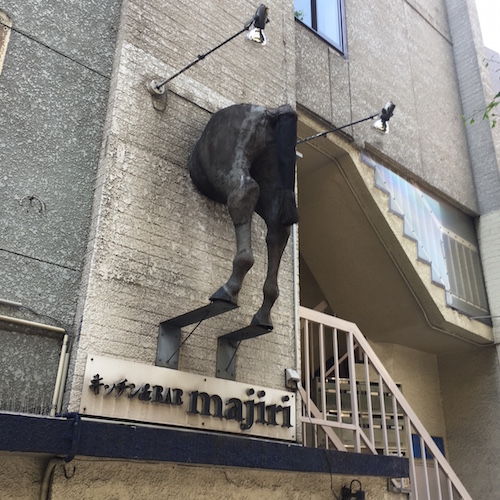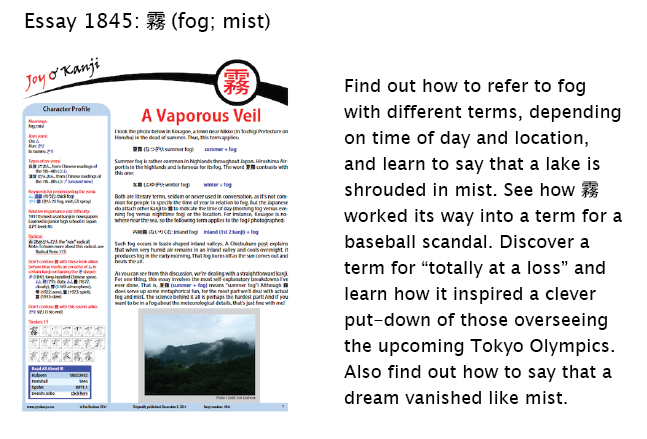The Butt of the Joke
What do you think the following term could mean:
尻馬に乗る (しりうまにのる) buttocks + horse + to ride
a. to ride a horse bareback
b. to ride on someone's coattails
c. to make a fool of someone
d. to play the fool
If you're feeling foggy about the question, you might appreciate my new essay on fog. Here's a preview:
Now for the answer:
b. "to ride on someone's coattails."
However, that's just one of many definitions:
尻馬に乗る (しりうまにのる: (1) to follow suit; imitate or follow someone blindly; (2) ride on someone's back; ride on someone's coattails; take advantage (e.g., of another's popularity)) buttocks + horse + to ride
In a recent conversation, the quiz went the other way. I tried to tell my language partner that I felt that a certain person (okay, it was Ivanka) enjoyed an influential position only because of nepotism. He didn't understand "nepotism," so I mentioned "to ride on someone's coattails." He didn't get that either and felt that it must involve an animal.
"No animal," I said.
"But it's about an animal's tail," he repeated.
"No animal."
I finally showed him images of what I meant, and he understood immediately (issuing one of those wonderful Japanese-only ああああああ sounds!), while I was unexpectedly charmed by the renderings.
Once he understood that there was no actual animal tail involved, I was left to wonder about the horse's buttocks in the equivalent Japanese expression. As I've now learned, the original meaning is simply that a second rider sits right behind the first one and is therefore on the horse's buttocks. The rider in the rear (and on the rear!) leaves it up to the front person to do all the work while fully sharing the benefits of that work—hence, all the figurative meanings.
Another language partner once kept using 尻-related expressions, such as this one:
尻拭い (しりぬぐい: cleaning up or covering for another; bearing the consequences of someone else’s error) buttocks + wiping clean
Oh, dear. I think I grasp the etymology of that expression all too well!
This was her favorite phrase:
尻が重い (しりがおもい: lazy, easygoing) buttocks + heavy
Using it to call herself lazy, she provided this explanation:
私は「お尻に火がつかないと、動きませんから」。
(I say that) because when there's no urgency, I don't move.
私 (わたし: I); 動く (うごく: to move)
Here was the 尻 idiom at the heart of her sentence:
尻に火がつく (しりにひがつく: to be pressed for time; be pressed by urgent business) buttocks + fire
Within that phrase lies another:
火がつく (ひがつく: to catch fire)
Flames leaping under the butt—yes, that would make someone move quickly!
At one point she said (and I almost heard a giggle coming through email), "I don't want you to think I'm always talking about 尻!" Ever since then I've teased her about her predilection for this word. In a sense, she's become the butt of my jokes!
Moving to another body part, I've just learned this term:
二枚舌 (にまいじた: lying) 2 + flat things + tongue
English speakers refer (probably in the past more than now) to a "forked tongue" for those who don't tell the truth. But the Japanese refer to two tongues, which I suppose are stacked! The middle kanji in that term is the counter for flat things such as sheets of paper ... and tongues! I've never needed to count tongues, but now I can!
Have a great week!
❖❖❖
Happy postscript: After seeing this blog, reader Russell Hogg sent me these great photos of his:

❖❖❖
Did you like this post? Express your love by supporting Joy o' Kanji on Patreon:




Comments